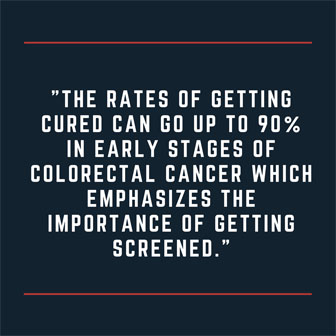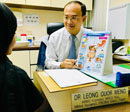COLORECTAL cancer is the number 1 cancer in men and number 2 cancer in women.
It is cancer of the colon and rectum (or the large intestine), which is the last part of the gastrointestinal tract.
This article will discuss the risk factors, the food that affect your colon, the symptoms of the cancer, preventative measures as well as provide information on treatment options.
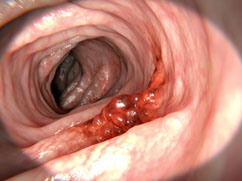
While there is an increased incidence of getting colorectal cancer when one is above the age of 50, it can occur at any other ages and that it displays no or little symptoms in the early stages.
In that regard, it is like stomach cancer, which we discussed in a previous article, Detect Stomach Cancer Early.
The good news is, colorectal cancer is one of the MOST PREVENTABLE cancers!
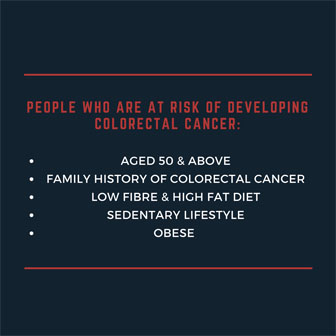
You Might Also Like To Read:
Fake News: Teaching Before Blindly Punishing?
Porsche Panamera 4 Sports Turismo Review
People who tend to consume a high amount of red meat and refined grains may be more likely to develop colorectal cancer than those who avoid these foods. A pro-inflammatory dietary pattern may chronically stimulate bowels, leading to increased production of inflammation mediators that may contribute to the development of this cancer.
To give an example of inflammation, it could even be something as small as an allergy that triggers a reaction in the body that may cause sinus. In this case, anti-histamines that one normally takes for allergies are mediators that relieve the inflammation symptoms.
To help promote good colon health, here are some diet recommendations, which may help to decrease the risk of colon cancer:
- Reduce intake of red meat
- Limit consumption of processed meat such as sausages, bacon and ham
- Eat more high-fibre foods such as fruit, vegetables, whole grains and legumes
- Limit intake of alcoholic drinks
In addition to dietary recommendations, having an active lifestyle such as exercising regularly is also highly advised.
Key symptoms to note about colorectal cancer:
- Change in bowel habits
- Recurrent abdominal discomfort, bloating or cramps
- Persistent fatigue or weakness
- Blood in stools or rectal bleeding
- Stools that are thinner than normal
- Incomplete bowel emptying
- Unexplained weight loss
 The Healthy Way is a regular health series developed for STORM.SG by Healthway Medical. If you have specific queries, please do email us at health@storm.sg and we will ask the panel of experts for their advice. Do note that only selected queries will be addressed.
The Healthy Way is a regular health series developed for STORM.SG by Healthway Medical. If you have specific queries, please do email us at health@storm.sg and we will ask the panel of experts for their advice. Do note that only selected queries will be addressed.
Colorectal cancer screening options
Despite strong evidence that screening for colorectal cancer saves lives, the actual uptake and practice of screening has been limited.
Dr Leong Quor Meng, Specialist in General & Colorectal Surgery, Nobel Surgery Centre said: “While symptoms may not always present at the early stages of colorectal cancer, early and regular screening can help to detect benign growths or polyps in the colon or rectum during the pre-cancer phase. These benign and polyp growths usually take years to turn cancerous which can be prevented after they are removed. The rates of getting cured can go up to 90% in early stages of colorectal cancer which emphasises the importance of getting screened.”
For More Articles in The Healthy Way series, visit www.storm.sg/health
The three methods of colorectal cancer screening are Faecal Occult Blood Test (FOBT), Virtual Colonography and Colonoscopy.
Most people need the exam just once a decade, and only a few with larger, more serious polyps may need it more often than every five years. 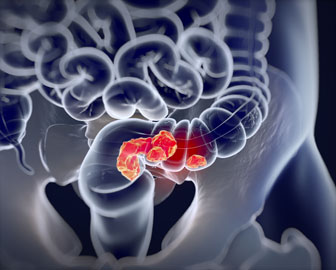
- FOBT — faecal occult blood testing — detects the presence of small amounts of blood (which cannot be seen with the naked eye) in the stools.
- Virtual Colonography is a CT scan that obtains hundreds of images of the colon as gas is passed through the anus. Any abnormal findings will require a colonoscopy for further evaluation.
- Screening Colonoscopy is a test that uses a flexible tube to look at the internal lining of the colon and rectum.
What is Screening Colonoscopy?
Screening colonoscopy is a direct visualisation of the entire colon and rectum using an endoscope inserted via the anus. It is considered the most accurate
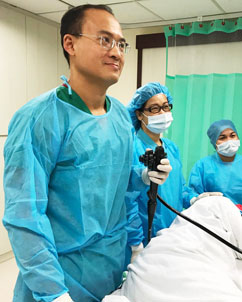
assessment of the colon and is the gold standard as it is both diagnostic and therapeutic. It should begin at the age of 50 for individuals without any risk factors. In high-risk individuals, screening should begin earlier, depending on the risk factors present for each individual.
Screening colonoscopy is the only screening test that combines detection with prevention by polypectomy and is recommended as one of the screening test options. It can detect and remove small polyps and pre-cancerous lumps. The long pre-malignant period of the adenoma-carcinoma sequence makes it ideal to screen for colorectal cancer.
The procedure is performed by colorectal surgeons and gastroenterologists and may be partially Medisave claimable in some hospitals and endoscopy centres as a day surgery procedure.
Treatment Options For Colorectal Cancer
Surgery is generally the most effective way to deal with colorectal cancer when it comes to removing cancerous growths. For patients with a very large tumour, or if it is invading an adjacent organ, we may recommend initial chemotherapy or radiotherapy to shrink the tumour before proceeding with surgery.
One of the great advances in colorectal surgery is the use of minimally invasive surgery methods such as laparoscopic surgery. It avoids the trauma of a large abdominal wound associated with conventional surgery and results in less pain and much quicker recovery for patients.
Dr. Leong added: “Treatment depends on the stage of the cancer and includes surgery, chemotherapy, and radiotherapy, alone or in combination. It is advisable for patients to discuss with their doctors on the most suitable method on a case-by-case basis. Every patient is different, and what is ideal for one patient may not be appropriate for another.”















